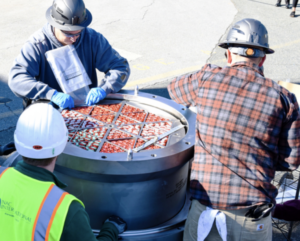In a clear sign of growing industry unease about the availability of water for power plant operations, utility officials recently surveyed by Black & Veatch on a host of policy and business issues ranked water supply as their second-highest environmental concern and identified water management as the business issue that could have the greatest impact on the utility industry in the near future.
Black & Veatch’s 2011 Strategic Directions in the Electric Utility Industry survey—the firm’s fifth annual survey of the power sector since 2007—noted that the types of water-related concerns varied depending on whether the respondent was from an investor-owned utility (IOU) or a municipal power system. The sidebar lists the top 10 concerns reported by utility executives, with links to further discussion and data.
Water Concerns Rule
"IOUs appear less concerned about water as a pressing environmental issue than their brethren in other utility sectors," the Kansas-based consulting firm said in commentary on its findings. "Perhaps public power systems are more concerned due to their geographical proximity to water supplies that have been threatened, because proportionately more of these utilities either rely on hydropower, or are affiliated with municipal and federal water supply departments or agencies.
"While water supply ranks only fourth among IOUs as an environmental issue, IOUs expressed the most concern about the broader issue of water management. Water effluent is far less of a concern among all of the survey sectors."
The survey comes as many utilities are facing the prospect of new federal or state controls on water intake and discharges at power plants, which can harm fish and aquatic life through impingement and raised water temperatures. A few utilities have had to curtail plant operations during severe droughts due to lack of adequate cooling water available from rivers at extremely low flows.
In another notable finding on a key environmental issue, Black & Veatch found that slightly more than half of the utility officials surveyed think that global warming is occurring as the result of a natural cycle, rather than being caused by rapidly increasing emissions of carbon dioxide from power plants and other sources. Only 41% of respondents agreed that the Earth is on a fundamental, man-made warming trend, and 8.2% said they don’t believe that the Earth is warming.
Carbon Still a Concern
At the same time, respondents ranked legislation to constrain carbon emissions as their top environmental concern—just slightly ahead of water supply. Respondents expressed far less concern about their companies’ actual carbon emissions.
Nuclear fuel disposal and storage tied with overall nuclear safety as the third-highest environmental concern. Black & Veatch noted that the survey was conducted immediately after the April disaster at the Fukushima Daiichi plant and said that incident likely accounted for the high ranking of the nuclear issues in this year’s survey.
Nonetheless, respondents said that nuclear power remained the most "environmentally friendly" technology, ahead of natural gas, which placed second. Interestingly, in this category hydropower ranked ahead of solar energy, wind, and coal gasification as environmentally friendly generation technologies that the industry must emphasize to address public concerns about pollution.
The utility executives’ water and greenhouse responses are striking in that climate change scientists say rising global temperatures will drive significant changes in weather patterns, with currently dry regions of North America facing more frequent and severe droughts and wetter regions of the continent experiencing more intense—but less frequent—precipitation events.
These changes likely will make it harder for power plants to obtain sufficient water for cooling, particularly in fast-growing regions such as the Southeast, which already has seen intense competition among states for dwindling shares of river water for industrial uses and human consumption.
Power Prices Will Rise
In addition, the survey found that nearly three-quarters of its utility executive respondents believe power prices will rise substantially over the next five years—likely reflecting industry concerns over looming Environmental Protection Agency regulations on various air quality, climate change and water quality issues that are expected to drive up prices.
"More than 70 percent of survey participants agreed or strongly agreed that energy and commodity prices would rise significantly in the next five years, signifying tremendous capital investment needs across the nation’s electric utility system," Rodger Smith, president of Black & Veatch’s management consulting business, said in a press release.
The survey found surprising optimism about the viability of energy storage devices, finding that approximately 20% of survey respondents are planning energy storage projects, indicating this technology is moving into more mainstream segments, Black & Veatch said.
"This also correlates with other survey responses where participants believe energy storage will have an important role within their systems beyond the next five years," the consulting firm said.
In sharp contrast, the survey found some skepticism among utilities about the likely impact of smart grid technology on their businesses—in part due to consumer indifference. The survey found low confidence among utilities in how well-understood the term "smart grid" is believed to be, both among consumers and within the industry itself.
In addition, some 58% of respondents said utilities have not made a good business case for deploying smart grid technology in their service territories, and only 24.5% said that they and their utility regulators have the same vision and expectation for the technology.
Notably, the survey found that utilities think the biggest impediment to smart grid implementation is "customers’ lack of interest and knowledge."
Among other findings, the survey also found that aging infrastructure, grid reliability, and government regulation, respectively, are the top three issues of concern to the industry.
Black & Veatch also said that only a slim plurality of respondents expect a carbon price will be put into effect within the next five years, with IOU respondents more skeptical than other industry respondents.
More than 80% of those surveyed believe that coal has a strong future in the United States, and respondents strongly agreed that regulation is the most important driver of technological innovation, well ahead of government incentives.
—Chris Holly is a reporter for The Energy Daily.










